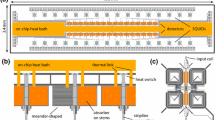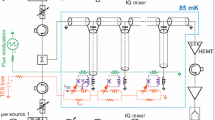Abstract
To our present best knowledge, microwave SQUID multiplexing (\(\mu \)MUXing) is the most suitable technique for reading out large-scale low-temperature microcalorimeter arrays that consist of hundreds or thousands of individual pixels which require a large readout bandwidth per pixel. For this reason, the present readout strategy for metallic magnetic calorimeter (MMC) arrays combining an intrinsic fast signal rise time, an excellent energy resolution, a large energy dynamic range, a quantum efficiency close to \(100\%\) as well as a highly linear detector response is based on \(\mu \)MUXing. Within this paper, we summarize the state of the art in MMC \(\mu \)MUXing and discuss the most recent results. This particularly includes the discussion of the performance of a 64-pixel detector array with integrated, on-chip microwave SQUID multiplexer, the progress in flux ramp modulation of MMCs as well as the status of the development of a software-defined radio-based room-temperature electronics which is specifically optimized for MMC readout.








Similar content being viewed by others
References
A. Fleischmann et al., Metallic Magnetic Calorimeters, in Cryogenic Particle Detection, Topics in Applied Physics (Springer, Berlin, 2005)
S.R. Bandler et al., J. Low Temp. Phys. 167, 254–268 (2012)
D. Hengstler et al., Phys. Scr. T166, 014054 (2015)
C. Bates et al., J. Low Temp. Phys. 184, 351–354 (2016)
M. Loidl et al., J. Low Temp. Phys. 151, 1055–1060 (2008)
L. Gastaldo et al., Eur. Phys. J. Special Topics 226, 1623–1694 (2017)
J. Clarke et al., The SQUID Handbook (Wiley-VCH, Weinheim, 2004)
K. Irwin et al., Appl. Phys. Lett. 85, 2107–2109 (2004)
J.A.B. Mates et al., Appl. Phys. Lett. 92, 023514 (2008)
J. Baselmans, J. Low Temp. Phys. 167, 292–304 (2012)
S. McHugh et al., Rev. Sci. Instrum. 83, 044702 (2012)
J.A.B. Mates et al., Appl. Phys. Lett. 111, 062601 (2017)
J.A.B. Mates et al., J. Low Temp. Phys. 167, 707–712 (2012)
S. Kempf et al., AIP Adv. 7, 015007 (2017)
S. Kempf et al., Supercond. Sci. Technol. 30, 065002 (2017)
E. Hogenauer, IEEE Trans. ASSP 29, 155–162 (1981)
T.J. Genrich et al., US Patent 5,596,609 (1997)
Acknowledgements
We would like to thank T. Wolf as well as the KIP cleanroom team for technical support during device fabrication. The work was performed in the framework of the DFG research unit FOR2202 (funding under En299/7-1), the European Microkelvin Platform EMP, the Karlsruhe School of Elementary Particle and Astroparticle Physics: Science and Technology (KSETA) as well as Heidelberg Karlsruhe Research Partnership HEiKA.
Author information
Authors and Affiliations
Corresponding author
Rights and permissions
About this article
Cite this article
Wegner, M., Karcher, N., Krömer, O. et al. Microwave SQUID Multiplexing of Metallic Magnetic Calorimeters: Status of Multiplexer Performance and Room-Temperature Readout Electronics Development. J Low Temp Phys 193, 462–475 (2018). https://doi.org/10.1007/s10909-018-1878-3
Received:
Accepted:
Published:
Issue Date:
DOI: https://doi.org/10.1007/s10909-018-1878-3




